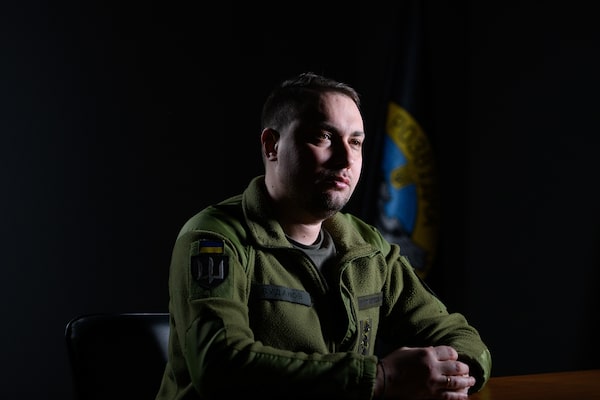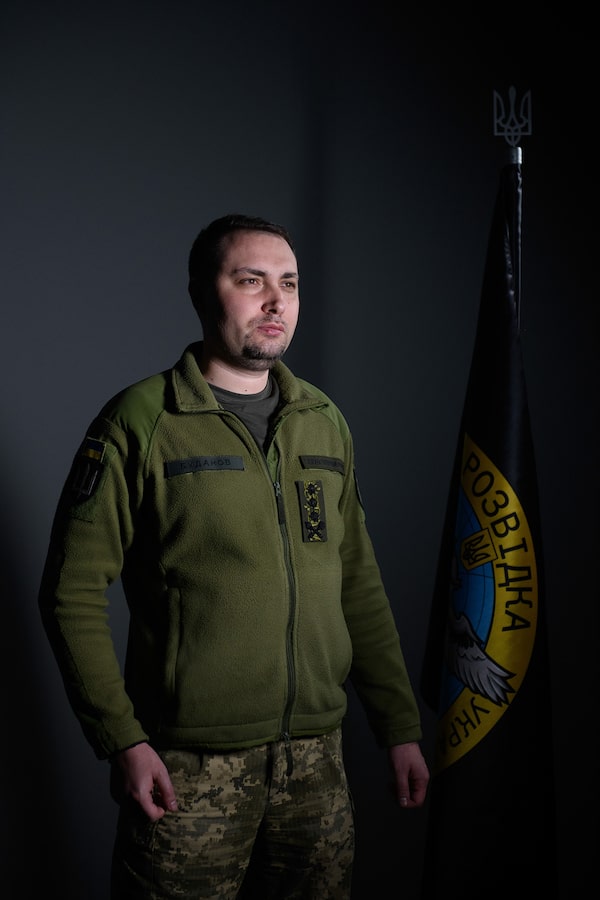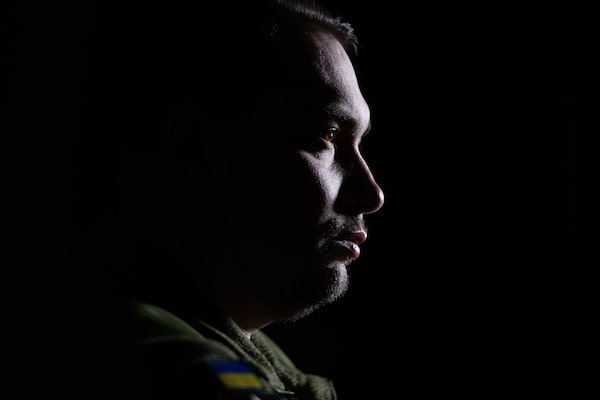
Lieutenant-General Kyrylo Budanov, Ukrainian Chief of the Defence Intelligence on March 2.Olga Ivashchenko/The Globe and Mail
When something blows up deep behind Russian lines, or inside Russia itself, Lieutenant-General Kyrylo Budanov is one of the few people who knows exactly what happened.
Lt.-Gen. Budanov commands Ukraine’s military intelligence service, which has carried out a series of attacks on Russian soil over the past two years ranging from drone strikes in Moscow and St. Petersburg to cross-border raids into the neighbouring Belgorod region. Russian prosecutors have charged Lt.-Gen. Budanov with masterminding more than 100 “terrorist” attacks on Russian soil, including an October, 2022, explosion that badly damaged the US$3.7-billion bridge connecting Russian territory to the occupied Crimean Peninsula.
That campaign of retributive violence is now widening to include battlefields far beyond Russia and Ukraine. Special forces from the military intelligence unit were involved in a January clash in Sudan in which they fought alongside Sudanese government forces against rebels aided by mercenaries from Russia’s notorious Wagner Group, according to two sources. The Globe and Mail is not identifying them because they are not authorized to publicly discuss the mission.
Lt.-Gen. Budanov wouldn’t directly discuss the scope of his unit’s operations beyond Ukraine’s borders. But the spymaster acknowledged that the fighters under his command were engaged in a multipronged effort to strike back at Russia and Russian interests, wherever they are.
“We are at war with the Russian Federation and everything to do with it,” Lt.-Gen. Budanov said in an interview with The Globe inside his heavily fortified headquarters on the outskirts of Kyiv. “This is a complex task, let’s say it like this. The main goal is to reduce the combat and moral potential of the Russian Federation. Combat, economic and moral.”

Lt-Gen Budanov commands Ukraine’s military intelligence service, which has carried out a series of attacks on Russian soil over the past two years.Olga Ivashchenko/The Globe and Mail
The enigmatic 38-year-old – the youngest-ever head of his country’s military intelligence service, which is known by its Ukrainian acronym, HUR – has become something of a folk hero over the two years since Russia launched its full-scale invasion of this country.
Despite his youth, he’s also become a figure of stability. President Volodymyr Zelensky has replaced both his defence minister and his top general over the past five months – the former over a corruption scandal, the latter following the failure of Ukraine’s major counteroffensive last year – but Lt.-Gen. Budanov’s post seems secure.
The military intelligence boss recently appeared on a stage in Kyiv alongside Mr. Zelensky’s chief of staff Andriy Yermak for a panel discussion marking the start of a third year of war. Lt.-Gen. Budanov’s message was simple: The attacks inside Russia would continue for as long as there were Russian troops inside Ukraine.
Before and after the session, Lt.-Gen. Budanov was swarmed by journalists, while Mr. Yermak – who many Ukrainians view as the most powerful person in the country besides Mr. Zelensky – looked on with a fixed expression.
Lt.-Gen. Budanov’s cool, unsmiling predictions of eventual Ukrainian success have made him popular among ordinary Ukrainians, though he is blamed in some quarters for inflating expectations of a rapid victory by vowing last year that Ukrainian troops would “enter Crimea” in 2023. He has claimed he didn’t misspeak, since the unit’s commandos did indeed carry out operations inside the occupied peninsula last year.
He is respected among his men, meanwhile, for personally taking part in some of the most dangerous missions.
“These are my people. If I give tasks to people, I have to be responsible for this,” he said, while declining to discuss any specific mission. “If I myself am afraid to take part, then the question of morality comes.”
Lt.-Gen. Budanov – who, according to The New York Times, was a member of an elite unit trained by the CIA – was reportedly wounded several times during the eight-year proxy war that preceded Russia’s full-scale invasion. He rose to his current post in 2020.
The route to ending the war, Lt.-Gen. Budanov believes, is to “modify” President Vladimir Putin’s regime. He won’t say precisely how he plans to do that, but it’s clear he isn’t waiting on a democratic uprising in Moscow.
“The Russian opposition will never do anything by itself,” he said, speaking one day after the funeral of Russian opposition leader Alexey Navalny. Unlike many Russians, who believe Mr. Navalny was murdered for his opposition to Mr. Putin, Lt.-Gen. Budanov says Mr. Navalny – who died inside an Arctic prison colony – was killed by a blood clot, as the Kremlin claims, though he won’t say why he’s confident of that.
Rather than co-operating with Russia’s pro-democracy opposition, which is now led by Mr. Navalny’s widow, Yulia Navalnaya, Lt.-Gen. Budanov and HUR work with Russia’s armed opposition, including units such as the Freedom of Russia Legion and the Russian Volunteer Corps, which have both taken part in cross-border raids that sources say were directed by HUR and Lt.-Gen. Budanov.
But he won’t get into details about HUR’s relationship with the Russians fighting against their own army. “They help us, we help them,” is as far as he’ll go.

Lt.-Gen. Budanov’s status as perhaps the leading thorn in the Russian military’s side has made him a target of at least 10 assassination attempts, his spokesperson saysOlga Ivashchenko/The Globe and Mail
Despite his air of confidence, Lt.-Gen. Budanov acknowledges that Ukrainian troops are currently losing ground along the 1,200-kilometre front line that swerves through eastern and southern Ukraine. He said his country will continue to lose territory as long as it is being starved of ammunition by its Western allies.
“It’s very bad,” he said when asked to assess the Ukrainian positions on the eastern Kharkiv front and southeastern Donbas region.
He specifically attributed the Feb. 17 fall of Avdiivka – a city in Donbas that had been on the front line since the start of the war – to shortages of artillery shells and other long-range weapons. Some US$60-billion in American military aid remains held up by partisan wrangling in Congress, and other Western countries have also slowed the pace of the assistance they’re providing.
Russia has subsequently advanced seven kilometres west of Avdiivka, capturing several small villages in one of the largest shifts in the front line in months.
“If we do not have ammunition, it is quite clear that our problems will increase. This is a direct dependence,” Lt.-Gen. Budanov said.
But while the larger Ukrainian army is expected to spend much of 2024 on the defensive, Lt.-Gen. Budanov said the special forces units under his control would keep up their attacks. “Our units that I’m in charge of, we don’t like defensive actions,” he said. “It’s too expensive to keep high-quality specialists on the defensive.”
Lt.-Gen. Budanov’s status as perhaps the leading thorn in the Russian military’s side has made him a target of at least 10 assassination attempts, his spokesperson says. That number does not include a mysterious November episode that saw his wife Marianna Budanova hospitalized after a poisoning that was likely an attempt on her husband’s life.
Ms. Budanova is feeling “much better” now, Lt.-Gen. Budanov says. As for whether the Russians will keep trying to kill him, he shrugs. “As you can see, I’m still here.”
 Mark MacKinnon
Mark MacKinnon